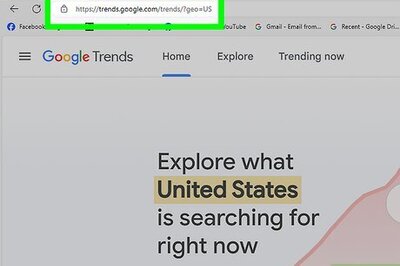
views
Rome: Italian Prime Minister Silvio Berlusconi will resign following a humiliating vote in parliament on Tuesday, President Giorgio Napolitano said.
The president said after meeting Berlusconi that the 75-year-old prime minister would step down as soon as parliament passed urgent reforms demanded by euro zone leaders to cut Italy's huge debt and boost stagnant growth.
The votes in both houses of parliament are likely this month.
The head of state said in a statement that following Berlusconi's resignation he would hold consultations on the formation of a new government.
Berlusconi had "demonstrated to the head of state his understanding of the implications of today's vote in the chamber of deputies", the statement said.
Berlusconi's government won a key budget vote after the opposition abstained on Tuesday but obtained only 308 votes compared with an absolute majority in the lower house of 316 votes.
Pier Luigi Bersani, leader of the main opposition Democratic Party, said Italy ran a real risk of losing access to financial markets after political uncertainty pushed yields on government bonds towards a red line of 7 per cent.
"I ask you, Mr Prime Minister, with all my strength, to finally take account of the situation ... and resign," Bersani said immediately after the vote.
Italy, considered too big to bail out, has replaced Greece at the epicentre of the euro zone sovereign debt crisis, with yields on government bonds close to unsustainable levels.
Berlusconi, a flamboyant media magnate, has been on the ropes for weeks, beset by a string of sex and legal scandals, political defeats and most crucially a loss of confidence on international markets.
But Berlusconi, who has dominated Italian politics for 17 years, had steadfastly refused to step down until Tuesday's vote.
The news that Berlusconi had finally agreed to resign came after European markets closed but had an immediate positive impact on markets in the United States. The euro jumped against the dollar and US stocks edged up.
Earlier, Berlusconi's key coalition ally Umberto Bossi, head of the devolutionist Northern League, said Berlusconi should be replaced by Angelino Alfano, secretary of the premier's PDL party.
"We asked the prime minister to stand down," Bossi told reporters outside parliament.
Berlusconi was defiant before Tuesday afternoon's vote on a public finance measure, rejecting calls from all sides to step down and trying to win back a large group of rebels in the PDL. The vote showed he had failed to stem the revolt.
Bossi's action and the parliamentary vote tipped the balance against him as red lights flashed on bond markets about Italy's instability.
The League, and many members of the PDL, were believed to have wanted Berlusconi to make way for a new centre-right government to tackle the grave economic crisis and restore the confidence of markets without handing power to a transitional administration.
The centre-left opposition said they abstained to lay bare the weakness of Berlusconi's support, while allowing the passage of a bill that is vital for government funding.
Interest rates on Italy's debt have soared to levels that are causing deep concern about the survival of the euro zone if its third largest economy cannot service its debts.
Yields on Italy's 10-year benchmark bonds rose to 6.74 per cent on Tuesday before dropping back. Analysts said Italy was reaching the point at which Portugal, Greece and Ireland had been forced to seek a bailout.
Finnish Prime Minister Jyrki Katainen said Italy was just too big to bail out. "It is difficult to see that we in Europe would have resources to take a country of the size of Italy into the bailout programme," he told parliament in Helsinki.
As the spread between Italian and German bonds - a reflection of the extra risk of holding Italian bonds - approached 5 per cent, Italian employers' association leader Emma Marcegaglia said: "We can't go on like this for long."
Analysts say current interest rates, if maintained, would cancel out the budget savings planned as part of a painful austerity programme.
Berlusconi is believed to have wanted to carry on until Christmas so that Italy would then go to early elections in 2012
Even when Berlusconi goes, there is no guarantee that reforms to cut massive debt and boost growth will be quickly implemented and relief on markets may not last long.
There is no agreement among political parties on either a national unity or technocratic government and Napolitano's consultations may be difficult.
Berlusconi and his closest allies say appointment of a government of technocrats, the option favoured by markets and it is thought Napolitano, would be an undemocratic "coup" that ignored the 2008 election result that brought the centre right to power.
Berlusconi has always insisted that the only alternative to him is to hold elections, a year ahead of schedule.

















Comments
0 comment